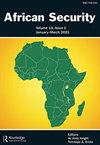Constructing the Herder–Farmer Conflict as (in)Security in Nigeria
IF 1.3
Q2 POLITICAL SCIENCE
引用次数: 32
Abstract
ABSTRACT The recent spate of violence mostly in north-central and southern Nigeria, typically credited to conflicts between herders and farmers, and the reactions, narratives, and representations that have attended them, calls for an examination of core security questions: who or what is to be secured, from what threat and by what means. In fact, it could be further contextualized as: how is the conflict between farmers and herders constructed, framed, and represented as (in)security within the Nigerian context? Several existing works have approached the evolving conflict between pastoralists and farmers in Nigeria from a range of perspectives, mostly accounting for the reasons or causal factors driving such conflicts. This commonly includes references to ecological factors as responsible for the uncontrolled north-south migration of herdsmen which encourages the struggle for – and access to – land and its resources between herders and farmers. At the same time, some studies point to the rise of herdsmen militancy and in doing so draw inconclusive links to other security issues in Nigeria such as terrorism and secessionist movements. However, there have been significant efforts by state officials and interest groups to describe the conflict, either as producing insecurity or to refute such claims of insecurity. This study employs critical constructivism as advanced by Jutta Weldes to examine how the conflict is framed and represented as insecurity. It finds that the discourses produced by the federal and state governments as well as interest groups, constructs it in specific ways by linking specific factors to offer possible explanations of the conflict. As such, the discourses that frame the herder-farmer conflict in Nigeria are: securitization, fulanisation, and sedentarisation. This study presents an important contribution to understanding the framing, constructions, and representations of the herder-farmer conflict in Nigeria.构建尼日利亚牧农冲突中的安全问题
尼日利亚中北部和南部最近发生的暴力事件,通常被认为是牧民和农民之间的冲突,以及对这些事件的反应、叙述和陈述,要求我们审视核心安全问题:谁或什么是安全的,从什么样的威胁中得到保护,以什么方式得到保护。事实上,它可以进一步被语境化:在尼日利亚的背景下,农民和牧民之间的冲突是如何被构建、框架和代表为安全的?已有的几部作品从多个角度探讨了尼日利亚牧民和农民之间不断演变的冲突,主要是解释了导致这种冲突的原因或因果因素。这通常包括提到生态因素是造成牧民不受控制的南北迁移的原因,这鼓励了牧民和农民之间争夺和获得土地及其资源的斗争。与此同时,一些研究指出,牧民武装分子的崛起与尼日利亚其他安全问题(如恐怖主义和分离主义运动)之间存在不确定的联系。然而,国家官员和利益集团做出了重大努力,要么将冲突描述为制造不安全,要么驳斥这种不安全的说法。本研究采用了由Jutta Weldes提出的批判性建构主义来研究冲突是如何被构架和表现为不安全感的。研究发现,联邦政府和州政府以及利益集团所产生的话语,通过将特定因素联系起来,以特定的方式构建它,以提供对冲突的可能解释。因此,构成尼日利亚牧民与农民冲突的话语是:证券化、富化和定居化。本研究对理解尼日利亚牧民-农民冲突的框架、结构和表现形式作出了重要贡献。
本文章由计算机程序翻译,如有差异,请以英文原文为准。
求助全文
约1分钟内获得全文
求助全文

 求助内容:
求助内容: 应助结果提醒方式:
应助结果提醒方式:


